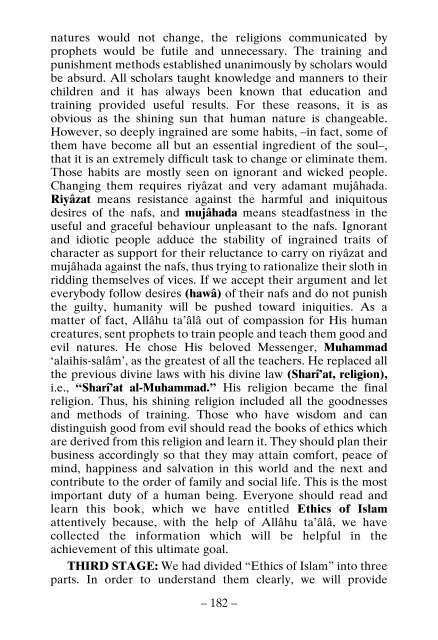Ethics of Islam
Ethics of Islam is taken from the book Berîka by Muhammad Hâdimi. Immorality and ways to get rid of it; 40 depravities and cures to them; usefulness of ethics; what is a soul; strengths of a soul; Personalities emanating from wisdom, courage, chastity and justice are extensively explained.
Ethics of Islam is taken from the book Berîka by Muhammad Hâdimi. Immorality and ways to get rid of it; 40 depravities and cures to them; usefulness of ethics; what is a soul; strengths of a soul; Personalities emanating from wisdom, courage, chastity and justice are extensively explained.
You also want an ePaper? Increase the reach of your titles
YUMPU automatically turns print PDFs into web optimized ePapers that Google loves.
natures would not change, the religions communicated by<br />
prophets would be futile and unnecessary. The training and<br />
punishment methods established unanimously by scholars would<br />
be absurd. All scholars taught knowledge and manners to their<br />
children and it has always been known that education and<br />
training provided useful results. For these reasons, it is as<br />
obvious as the shining sun that human nature is changeable.<br />
However, so deeply ingrained are some habits, –in fact, some <strong>of</strong><br />
them have become all but an essential ingredient <strong>of</strong> the soul–,<br />
that it is an extremely difficult task to change or eliminate them.<br />
Those habits are mostly seen on ignorant and wicked people.<br />
Changing them requires riyâzat and very adamant mujâhada.<br />
Riyâzat means resistance against the harmful and iniquitous<br />
desires <strong>of</strong> the nafs, and mujâhada means steadfastness in the<br />
useful and graceful behaviour unpleasant to the nafs. Ignorant<br />
and idiotic people adduce the stability <strong>of</strong> ingrained traits <strong>of</strong><br />
character as support for their reluctance to carry on riyâzat and<br />
mujâhada against the nafs, thus trying to rationalize their sloth in<br />
ridding themselves <strong>of</strong> vices. If we accept their argument and let<br />
everybody follow desires (hawâ) <strong>of</strong> their nafs and do not punish<br />
the guilty, humanity will be pushed toward iniquities. As a<br />
matter <strong>of</strong> fact, Allâhu ta’âlâ out <strong>of</strong> compassion for His human<br />
creatures, sent prophets to train people and teach them good and<br />
evil natures. He chose His beloved Messenger, Muhammad<br />
‘alaihis-salâm’, as the greatest <strong>of</strong> all the teachers. He replaced all<br />
the previous divine laws with his divine law (Sharî’at, religion),<br />
i.e., “Sharî’at al-Muhammad.” His religion became the final<br />
religion. Thus, his shining religion included all the goodnesses<br />
and methods <strong>of</strong> training. Those who have wisdom and can<br />
distinguish good from evil should read the books <strong>of</strong> ethics which<br />
are derived from this religion and learn it. They should plan their<br />
business accordingly so that they may attain comfort, peace <strong>of</strong><br />
mind, happiness and salvation in this world and the next and<br />
contribute to the order <strong>of</strong> family and social life. This is the most<br />
important duty <strong>of</strong> a human being. Everyone should read and<br />
learn this book, which we have entitled <strong>Ethics</strong> <strong>of</strong> <strong>Islam</strong><br />
attentively because, with the help <strong>of</strong> Allâhu ta’âlâ, we have<br />
collected the information which will be helpful in the<br />
achievement <strong>of</strong> this ultimate goal.<br />
THIRD STAGE: We had divided “<strong>Ethics</strong> <strong>of</strong> <strong>Islam</strong>” into three<br />
parts. In order to understand them clearly, we will provide<br />
– 182 –

















